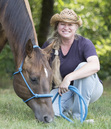Elena Hartwell's Blog, page 70
September 2, 2018
Killer Nashville: Crime Writers & Live Music at Puckett’s
Last weekend I attended Killer Nashville, one of my favorite writers conferences of the year. As you can guess from the title, the conference focuses on crime fiction. Located in Cool Springs, Tennessee, it’s also a great excuse to drive out to Leiper’s Fork and catch live music at Puckett’s.
The Conference
The sold out conference included some amazing speakers, including Jeffery Deaver, author of the Lincoln Rhyme series, and historical novelist Anne Perry.
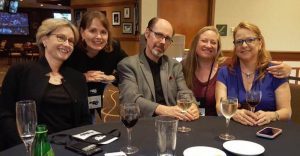
It’s the perfect size conference. You can find everyone in the bar! (Photo: Carrie Smith, Sheila Sobel, Jeffery Deaver, Elena Hartwell, J.D. Allen).
Panels run the gamut from investigative techniques to how to use social media to why writers write what they write.
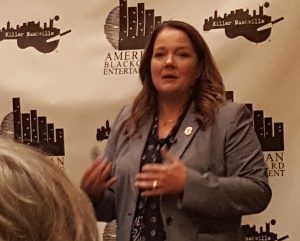 One of my favorite panels was An Inside Look at a Forensic Lab taught by TBI Agent Jenifer Hall.
One of my favorite panels was An Inside Look at a Forensic Lab taught by TBI Agent Jenifer Hall.
She had invaluable information about the way crime scene investigation actually happens in the real world (and the unreasonable expectations TV shows like CSI creates for juries).
I was on three great panels: The Differences between Urban & Rural Readers, Writing Women’s Fiction, and Writing Humor. So much fun to chat with readers and other writers alongside wonderful fellow panelists. Writers may be an introverted lot, but get us talking about writing and we never run out of things to say.
Thursday
The highlight of Thursday is the ‘Shine ‘N Wine Shindig put on by Bryan Robinson, author of multiple novels and nonfiction books, including the upcoming #Chill. The moonshine and wine mixer is a great way to reconnect with old friends and make new ones.
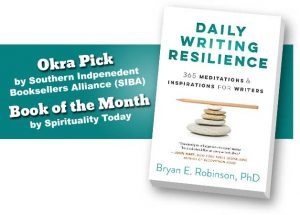
Friday
Friday included panels, a networking lunch, a shout out to debut authors, and the opening of the Crime Scene, set up by a member of TBI and “investigated” by conference attendees. A great way to put your sleuthing techniques to use!
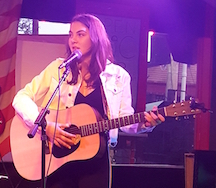
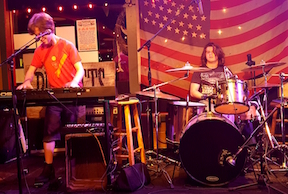 Friday night I went out to Puckett’s of Leiper’s Fork. One of my favorite places for live music. Located in charming Leiper’s Fork, Tennessee, Puckett’s never fails to deliver. This year it was three acts, Evie, a solo singer from Australia, a duo called Justadot, and a trio of siblings called Graceman.
Friday night I went out to Puckett’s of Leiper’s Fork. One of my favorite places for live music. Located in charming Leiper’s Fork, Tennessee, Puckett’s never fails to deliver. This year it was three acts, Evie, a solo singer from Australia, a duo called Justadot, and a trio of siblings called Graceman.
The oldest performer was 19. The music was exceptional. I have no doubt we’ll be hearing more from all of these musicians.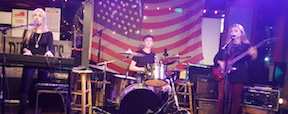
Saturday
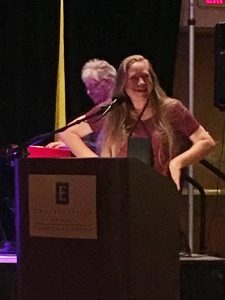 Saturday was a blur of panels, book signings, and another great lunch event. The day culminated in the awards banquet. I’m thrilled to have won a Claymore Award! I had been over-the-moon to be a finalist.
Saturday was a blur of panels, book signings, and another great lunch event. The day culminated in the awards banquet. I’m thrilled to have won a Claymore Award! I had been over-the-moon to be a finalist.
So much so, I didn’t expect to make the top three and found myself in a situation I’ve never been before … at a total loss for words!
Congratulations to all the Claymore and Silver Falchion winners! I’m honored to be in such an illustrious group.
Sunday
 With two panels and a book signing before a drive to the airport, two planes, then a 45-minute drive home, Sunday was a very long day! But totally worth it. Writers conferences are a great way to meet with readers, bond with other authors, and stay in touch with the industry that baffles us on a good day.
With two panels and a book signing before a drive to the airport, two planes, then a 45-minute drive home, Sunday was a very long day! But totally worth it. Writers conferences are a great way to meet with readers, bond with other authors, and stay in touch with the industry that baffles us on a good day.
Writing can be a lonely process, but being a writer doesn’t have to be. It’s events like Killer Nashville that connect us together. Thank you Clay Stafford, Liz Gatterer and all the volunteers that made Killer Nashville 2018 a fantastic event!
See you next year!
The post Killer Nashville: Crime Writers & Live Music at Puckett’s appeared first on Elena Hartwell.
August 26, 2018
Two Crime Writers & the ITW Debut Program
 International Thriller Writers supports all Crime Writers
International Thriller Writers supports all Crime WritersI have been involved with the International Thriller Writers since I debuted my Eddie Shoes Mystery Series in 2016. ITW supports debut authors in several ways: The Thrill Begins, an online source for debut and aspiring writers, The Big Thrill Online Magazine, and the Debut Author Program. All this culminates in the Debut Author Breakfast at ThrillerFest in July.
It’s my pleasure to host the debut authors on my blog. It’s a great way to introduce you to brand new books from brand new authors. I’m thrilled to start out with Howard Michael Gould and Catharine Riggs.
The Authors
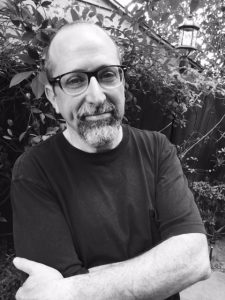 Howard Michael Gould: For many years he was paid to write screenplays and television pilots which for one reason or another did not get made but which garnered enough regard that he kept getting paid to write more screenplays and television pilots which also did not get made. Frustrated with that treadmill, he began to focus on writing original material outside of the traditional Hollywood development system, and had just enough scripts get produced–and, more important, enough come close to getting produced–to spend many years on that treadmill.Along the way, however, he’s somehow managed to be largely or even principally responsible for several pieces in various mediums which, though relatively unknown, still make him smile, and one which still gives him chest pains. You can find Howard on his website and follow him on TWITTER
Howard Michael Gould: For many years he was paid to write screenplays and television pilots which for one reason or another did not get made but which garnered enough regard that he kept getting paid to write more screenplays and television pilots which also did not get made. Frustrated with that treadmill, he began to focus on writing original material outside of the traditional Hollywood development system, and had just enough scripts get produced–and, more important, enough come close to getting produced–to spend many years on that treadmill.Along the way, however, he’s somehow managed to be largely or even principally responsible for several pieces in various mediums which, though relatively unknown, still make him smile, and one which still gives him chest pains. You can find Howard on his website and follow him on TWITTER
The Book
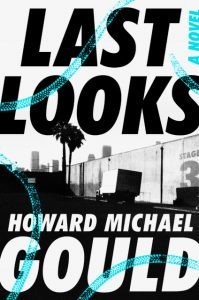 Last Looks: Former LAPD superstar detective Charlie Waldo, paying self-imposed penance for an old case gone horribly wrong, lives deep in the woods as a minimalist, pathologically committed to owning no more than one hundred things. But after the girlfriend he left behind tracks him down and disrupts his solitude, he finds himself forced back into action, dragged into a sensational Hollywood murder investigation.
Last Looks: Former LAPD superstar detective Charlie Waldo, paying self-imposed penance for an old case gone horribly wrong, lives deep in the woods as a minimalist, pathologically committed to owning no more than one hundred things. But after the girlfriend he left behind tracks him down and disrupts his solitude, he finds himself forced back into action, dragged into a sensational Hollywood murder investigation.
The Interview
Describe your publishing journey:
I’ve been working in Hollywood as a TV and screenwriter. I had a detective screenplay that kept coming close to getting made, but not quite. I hadn’t written fiction since I was a teenager, but I didn’t want this material to die, as so many screenplays do, so I tried reverse adapting it. After that, everything came easily (for, truly, the first time in my entire career): I got an agent right away, and he sold it in the first volley of submissions.
What inspired you to write this novel?
It began when I watched an amazing online video called “The Story of Stuff,” about the vicious cycle of consumerism and the destruction of the planet. It made me more conscientious about my own “things,” and I started thinking about a character who wasn’t just conscientious but obsessed. At the time I was hoping to come up with a new detective character, originally thinking about television, and that led me to Charlie Waldo. So it started as a TV pitch, then became a screenplay, and finally the novel LAST LOOKS.
What are you working on now?
A few things: editorial revisions on a second Waldo novel, which is called BELOW THE LINE; early outlining on a third Waldo novel; and a little TV development. I’ve also done some recent rewriting on the script for the movie version of LAST LOOKS, which we’re hoping to start shooting late this fall.
Congratulations Howard! Thanks for hanging out with us, and good luck on all your future endeavors.
Author
 Catharine Riggs lives and writes on California’s central coast. A graduate of UCLA with an MBA from Drake University, Riggs is a former business banker, adjunct college instructor, and nonprofit executive with a handful of unpublished manuscripts locked away in a drawer.
Catharine Riggs lives and writes on California’s central coast. A graduate of UCLA with an MBA from Drake University, Riggs is a former business banker, adjunct college instructor, and nonprofit executive with a handful of unpublished manuscripts locked away in a drawer.
What She Gave Away is her debut novel. She is currently at work on the second novel in her Santa Barbara suspense series.
To learn more about Catharine Riggs, visit her website, and follow here on TWITTER, GOODREADS, and INSTAGRAM
Her book is available on AMAZON and BARNES&NOBLE
The Book
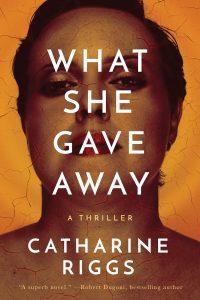 What She Gave Away is a psychological suspense novel featuring an outsider with a dark past and a bitter grudge who moves to a wealthy beachside community only to find herself enmeshed in the secrets of her boss and his hapless wife.
What She Gave Away is a psychological suspense novel featuring an outsider with a dark past and a bitter grudge who moves to a wealthy beachside community only to find herself enmeshed in the secrets of her boss and his hapless wife.
Spanning two years and told in the protagonists’ alternating voices, What She Gave Away reveals the power of choice, the price of revenge and the treachery of denial.
The Interview
Describe your publishing journey:
I wrote for thirteen years and completed three full manuscripts before I signed with an agent. At that point, I had attended numerous workshops and conferences, studied articles, absorbed criticism, adjusted plots and queried agents. I had also gotten into the habit of writing daily in the early morning hours. But despite my best efforts, I could not crack the code to the traditional publishing world. A fellow writer suggested a workshop taught by bestselling authors Robert Dugoni and Steven James. I was hesitant to spend the money but finally signed up and submitted the first fifty pages of my recently completed dystopian. A few weeks later, I received an e-mail praising the pages and requesting the full manuscript. Long story short, Robert Dugoni sent my manuscript to his agent and within a few weeks I had secured representation with the agent of my dreams.
Then came disappointment. We didn’t sell that book. But several editors expressed interest in my writing so I got to work on an idea for a suspense novel I’d been mulling over for months. The years I’d spent honing a disciplined writing habit paid off. I wrote the first draft of What She Gave Away in a quick four months and within six months closed a two-book deal with Thomas & Mercer. Quoting from Kent Haruf, “You have to believe in yourself despite the evidence.”
What inspired you to write this novel?
I am a “seat of the pants” writer who always starts with voice. A few years ago, I was coming off of a terrible bout with the flu when I attended a four-day UCLA workshop focused on writing scenes. The first morning, our insightful instructor asked us to create an emotional scene and in my weakened state, an angry young woman came to life and flew onto the page. I read the scene aloud and in response, a well-dressed older gentleman insisted no one would ever be interested in a plus-sized, revenge-driven woman. His remarks bothered me enough I decided to craft an entire novel around my newborn character. Crystal began life as the antagonist of What She Gave Away but soon morphed into one of the two protagonists.
What are you working on now?
I have recently completed the second novel in my Santa Barbara Suspense series. The book is loosely linked to my debut novel by location and secondary characters. The plot involves a series of unsolved murders at a wealthy retirement community and similar to What She Gave Away, the protagonists share a devastating secret that threatens to ruin their lives. Themes of body image, denial, family secrets and corporate corruption once again permeate the work.
Very inspiring story Catharine! Congratulations on your novel and best of luck with book two!

Check back soon for more ITW Debut Authors.
Photo by kat wilcox from Pexels
The post Two Crime Writers & the ITW Debut Program appeared first on Elena Hartwell.
August 18, 2018
Take a Break With A Short Story at The Beach
As many of you know, I love to support past, present, and future writers through my blog. Usually I do that with posts about the writing process, the business of writing, or interviews of published authors. This week I have something very special. It’s an honor to post a short story written by one of my favorite short story authors, Pauline Yates. I hope you enjoy her writing as much as I do.
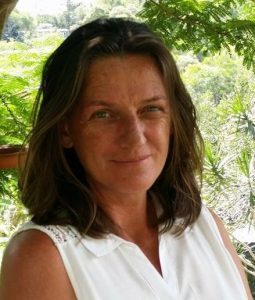 A born storyteller, Pauline Yates has amassed a collection of short stories that range from historical fiction to hard sci-fi, but her weakness is for comedy, which likes to sneak into her work.
A born storyteller, Pauline Yates has amassed a collection of short stories that range from historical fiction to hard sci-fi, but her weakness is for comedy, which likes to sneak into her work.
Her stories can be found in publications including: Metaphorosis, Abyss and Apex, Short Fiction Break, and The Casket of Fictional Delights. She is the author of Rumours Uncut, a digital interactive thriller for Story City, and contributed to the science fiction 5×5 Reading Anthology published by Metaphorosis Books.
Pauline lives in Queensland, Australia. Follow her on Twitter @midnightmuser1.
When The Tide Turns
by Pauline Yates
I want to run from the back exit of the nursing home to the car park, but all Evelyn can manage is a crab-like shuffle. Her wheezing giggles don’t help.
“We’ll be seen for sure,” I tell her.
“No, we won’t,” she says, her voice muffled by the mask connected to the portable oxygen tank hidden in her backpack. “Staff take their tea break during visiting hours.”
I don’t know why I worry. Evelyn knows the daily routine better than I do. I guess I want to make sure today, of all days, is perfect. I planned for everything—except for Nurse Nora refusing to give Evelyn a day pass. Not that it mattered. Weren’t we the experts at absconding from school? Evading a nurse was no different than hiding from a teacher.
When we reach my car, I slip the backpack from Evelyn’s shoulders and help her into the passenger seat.
“Stay down until we get out of here,” I say.
Evelyn leans her head back against the seat. “Any exertion could exacerbate her condition,” she says, mimicking Nurse Nora. She sucks in a gasp of oxygen before continuing. “She won’t check on me for hours, if at all.” She pauses. “Mr. Andrews died last night. She’ll be busy.”
“Wasn’t he nearly one hundred?” I liked Mr. Andrews with his grandfatherly wisdom.
“Yeah. Lucky bastard.”
Lucky he died or lucky he lived the full term of his life? I sigh. I hate seeing Evelyn in this nursing home, but where else can she go? There’s no palliative care facility for a twenty-six-year-old stricken with cancer. Instead, she’s been shoved in with the elderly who discuss the latest death or talk about long lives Evelyn will never experience. With Evelyn’s deteriorating condition, she could be next in line to die, but if that’s the case, who has the right to deny her a day out in fresh air and sunshine? But when Evelyn takes another gasp of oxygen, I wonder if I’m doing the right thing in sneaking her out.
“Are you sure you can do this?” I ask as I slide into the driver’s seat.
She nods. “Just drive.”
It takes an hour to get to my planned destination. When I reach a dirt road, I roll down the windows. Evelyn has been quiet for the entire trip, but her eyes brighten when she smells the fresh air. “Where are we going?”
I smile. “You’ll see.”
My secret is revealed when we crest a hill. In front of us, the ocean stretches to the horizon. White-capped waves roll with the incoming tide.

The road winds down the other side of the hill to a beach at the bottom. I pull over near a sandy track. The path isn’t long, but after wasting energy escaping the nurse, I wonder if Evelyn has the strength to make it.
But she’s already getting out of the car— the scent of the sea has renewed her strength. I hurry to help her.

She smiles at me. “You remembered.”
“Of course I did. I’m not your best friend for nothing, you know.”
She stares toward the ocean. “I didn’t think I’d ever get the chance to see it again.”
I collect a picnic basket and a blanket from the back seat. “Think you can make it to the end?”
“I’ll die trying.”
My heart tugs. One day, she will die. But not today. Today the northerly breeze will warm her face and sand will polish her feet. And if she can’t sleep tonight, she’ll be able to numb her pain by breathing in time to the memory of the rise and fall of the ocean.
When we reach the beach, I spread out the blanket and help Evelyn sit before she collapses. Her pinched expression shows the effort of walking through sand. Hearing her short breaths, I raise the oxygen mask to her mouth, but she pushes my hand away.
“It’s been so long since I’ve tasted the salt of the sea,” she says.
I sit down next to her. This is her moment, the moment I defied authority to give her. I want her to experience the sense of peace that can only be found on an isolated beach.
When the wind changes to the east, Evelyn places her hand over mine. “Thank you.” She starts to rise, but I grab her hand.
“Wait. I’ve got one more thing before we go.” Reaching into the basket, I pull out a cupcake complete with white frosted icing and a single candle. Pulling out a lighter from my pocket, I light the candle and hold out the cupcake. “Happy birthday. Make a wish.”
 Evelyn laughs. “You know wishes don’t work.” But she leans forward and blows. She wheezes through another laugh. I think the wind helped snuff the flame. She coughs. Then closes her eyes at what I know is a stab of pain in her chest.
Evelyn laughs. “You know wishes don’t work.” But she leans forward and blows. She wheezes through another laugh. I think the wind helped snuff the flame. She coughs. Then closes her eyes at what I know is a stab of pain in her chest.
“I wish I could die right here,” she says, her voice breaking, “with the sea in my ears and the sand in my toes and my best friend by my side.”
Placing the cupcake on the blanket, I hug her to me. What else can I do to ease her pain? Even if it means losing my best friend, I repeat her wish in my mind. But deep down, I know she’s right. Birthday wishes don’t come true. If they did, the cancer in her ovaries wouldn’t have spread to her lungs, and she wouldn’t be in any line waiting for death to call her number. A tear rolls down my cheek. Ignoring it, I sit with Evelyn in a silence only best friends know how to share and watch the waves roll onto the beach.
When the tide turns, I remember the time. “We should get back. Nurse Nora will have me arrested.”
Evelyn doesn’t move.
“Evelyn?” I shake her shoulder. The oxygen mask falls from her hand.
I hug her to me tighter than ever. I didn’t plan for this.
END
Dedicated to my Mum, who I never got to take to the beach.

Photo Credits: (Click the links to visit)
Cover: Photo from Pexels
Beach: Photo from Pexels
Sand/Ocean: Photo by Nathan Cowley from Pexels
Candle: Photo from Pexels
Footprints in the sand: Photo from Pexels
The post Take a Break With A Short Story at The Beach appeared first on Elena Hartwell.
August 12, 2018
The Query Letter: A basic overview
Write, rewrite, repeat … then query.
As the final installment of my three-part series on the basics of publishing, I’m including a quick overview of the query letter. I’ll be following this post up with another on how to know when your work is ready to query.
The first part of my series covered the Three Tiers of Publishing. You can read about the differences between the Big 5 (or maybe 6!), small presses, and self-publishing by clicking the link here. I also wrote about the fundamental differences between editors, agents, and pr companies. You can read that post by clicking here.
Lastly, you can gain some insights into freelance editing, by reading my interview with freelance editor Andrea Karin Nelson of Allegory Editing by clicking the link here. And now, on to the query letter!
What is a Query Letter?
A query letter is a letter to an agent or editor stating your interest in working with them, their agency, or their publishing house. I’m using “editor” in this post to refer to small publishing houses that allow for non-agented submissions. Further, this post is primarily focused on novelists pitching fiction. Please be aware that non-fiction is pitched very differently. Non-fiction it typically pitched through a proposal. More on that in future posts. Memoir, though “true,” is usually pitched like fiction, because most memoirs (unless you’ve been president, sold out a stadium, or been seen on the silver screen) are sold based primarily on the quality of the writing and should be pitched as a finished, polished “story.”
What goes in a Query Letter?
Rule number one in writing a query letter is to follow the guidelines for the agent or publisher you are pitching. Below you’ll find some information about how to identify agents and editors. But first, there are some basic rules that will help you write a good query letter.
Query letters should be short and sweet.
Typically one page. Though most queries are now written in an email, a single page on a word document is a good way to assess the length of your query. For an email, you want a letter the reader doesn’t have to scroll to read. As different programs have different size/type of font, it can vary, but if you write it out on a word document first, you’ll have a good sense of appropriate length.
Query letters should include “comp titles.”
Comp titles: Usually for “comparable titles” though on occasion you will here “complementary titles.” Regardless, it means the same thing, titles of successful books similar to your work. This is tricky, because you want to be honest without bragging.
Choose titles published in the last two years.
New York Times Bestsellers are great, but don’t compare your work to J.K Rowling or Stephen King. Choose authors that have solid track records but don’t choose George R. R. Martin.
This is the opportunity to show the agent or editor that you understand your genre. That you know what shelf your novel belongs on at the bookstore. Further, it’s a short cut for an agent or editor to know if you are pitching the type of work they represent. 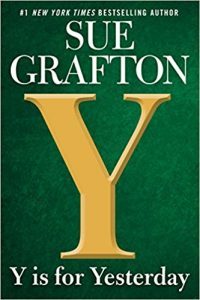
For example, if I were to pick comp titles for my Eddie Shoes Mystery Series, I might go with Eddie Shoes combines Sue Grafton’s Kinsey Millhone with Janet Evanovitch’s Stephanie Plum. I could stay with the author/characters or choose the two most recent novels in the series.
An agent reading that comparison would know immediately I have a female sleuth, that I use humor in my mysteries, and that the personal relationships of the characters are going to be important. I’m choosing very well known authors in my genre, who write similar novels with great track records. Y is for Yesterday came out in 2017 as did Evanovitch’s most recent book in her Plum series.
Query Letters should include a short synopsis of the book and contact information.
The synopsis should cover the protagonist(s), the central conflict, and what’s at stake. Don’t include too many characters or plot points. Just hit the most important events or objectives of the protagonist. Do include the genre and subgenre if appropriate. For example, if you write a mystery, mystery is the genre. If you write a police procedural, that is the subgenre. Know your genre! Agents and publishers have genres they read, enjoy, and represent. Make sure the people you pitch are looking for what you write.
Don’t forget your contact information! Include address, phone number, email. Don’t assume that because you have sent the query in an email they “have” your email address. Queries can be forwarded, printed out, passed on etc. Include your email address with the contact information.
Query Letters can include a brief statement about you.
If it feels relevant or is requested in the guidelines. Keep this short. Typically include only traditionally published novels or small press/self-published novels that have sold thousands of copies or have won prestigious, legitimate awards. Include articles, short stories, or other relevant projects, such as inclusion in an anthology or placement in a story competition. Don’t list hobbies, degrees, travels, or other unrelated details unless it directly applies to the project. It’s okay to mention platform if you have one. For example, if you write a novel about a soldier recovering from PTSD and you are a combat veteran with 10K followers on your blog about military service, that’s relevant.
Query Letters should be tailored to each person you submit to and follow the guidelines for that agent, agency, or publisher exactly.
So, how do you find agents and editors and what their guidelines are?
How do I find who to send a Query to?
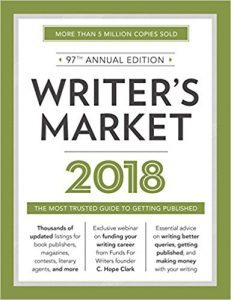
Every agent, agency, and editor has different guidelines for submissions. The first rule in pitching your work is do your homework. There are a number of resources out there for identifying agents and editors willing to accept submissions. One of the most commonly used source is Writer’s Market, which is updated annually.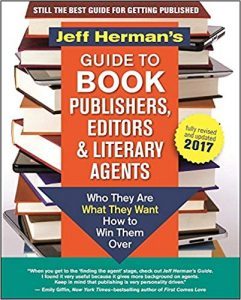
Writer’s Market lists agents, publishing houses, and other opportunities such as contests, where a writer can submit their work, usually through a query letter. Writer’s Market can be purchased online and at most brick and mortar bookstores.
There are other books on the market, such as Jeff Herman’s Guide to Book Publishing, take a look through your local bookstore, library, or online and you’ll find multiple choices. Make sure it lists what genre the agent or editor is looking for and their website.
After you identify an agent or editor you are interested in querying, go to their website and confirm their guidelines. Agents and editors sometimes take a hiatus from accepting submissions or change their guidelines from when the source material was published. Always double check the guidelines and what type of work the individual is accepting.
There are also online services that provide information about the industry, such as Publishers Weekly. It’s never too early to start educating yourself about the business of being a published author.
Lastly, there are a number of books on the process of writing a good query letter along with multiple articles and suggestions online. Go to the library. Read suggestions from agents and editors online. Do your homework!
Always make sure you spell the name of the person you are querying correctly. Don’t use Ms./Mrs./Mr. without checking on the gender of the person. If you are unsure about Ms./Mrs., use Ms. A lot of agents are on Twitter or Facebook or other social media. They also have interviews and profiles available online. Read through those to get a sense of what they like to read.
Keep in mind agents and editors receive hundreds of submissions each week. Be professional. Double-check your grammar and spelling. This is your first chance at making a good impression. If you can, have another writer read through your letter first. You would’t send out a first draft of your novel for an agent to read, don’t send out the first draft of your query letter.
You get one chance to make a first impression. Don’t waste it! But at some point, you will have to take that first step. Check back for my post on how to know when you’re ready to take it!
The post The Query Letter: A basic overview appeared first on Elena Hartwell.
August 5, 2018
Freelance Editor: Andrea Karin Nelson
As I mentioned in my recent post about the roles of agents and editors, some editors are in-house with a publishing company, while others work freelance. Freelance editors work with both first-time and previously published authors. Everyone can use a professional set of eyes on their work, regardless of their experience.
To provide a little more insight into the world of freelance editors, I’m pleased to bring you, Andrea Karin Nelson.
The Editor

Andrea Karin Nelson is a writer, editor, educator, theater artist and Sign Language interpreter. She is the founder and principal editor of Allegory Editing.
When she is not immersed in all things language and stories, she can be found cooking, gardening and practicing yoga. She makes her home in Seattle with her fantastic husband, their exuberant son and the family’s sweet-as-can-be cat.
The Interview
“I realized my skills and years of experience in those eclectic fields were something unique I could bring to the profession of editing.”
What led you to freelance editing?
Well, that is a bit of a long story! My path to freelance editing was circuitous, but every step of my journey led me here. I’ve spent my entire professional life in the business of language and stories.
I’m a theater maker (actor, playwright and teaching artist). Through that work, I tell my own stories and help others tell theirs. I’m a writer (novelist, short story writer and playwright). That work, of course, often goes hand-in-hand with professional editing.
I’m a Master-level Certified Sign Language Interpreter, which immerses me in the nuances of language and communication. Interpreters have to be keenly attuned not only to what is being said, but the how and why as well. I am a socio-linguistic nerd!
And I’m an educator. I’ve taught everything from conflict resolution in maximum security prisons to preschool drama classes and everything in between. My “teacher’s heart” deeply informs my work as an editor.
For years I traded critiques with writer friends. I loved it. I discovered I was good at it. One day I finally asked the question, “wait, do people actually do this as a job?” Turns out, yes!
As I looked into editing professionally, I realized my skills and years of experience in those eclectic fields were something unique I could bring to the profession of editing. It was a natural fit. I dove in and haven’t looked back since!
What exactly does a freelance editor do, and how is that important for a writer?
I am a developmental editor, which means I help writers develop and strengthen their manuscript (or short story or script) to get it ready for the next step. That next step could mean self publishing or submitting to publishers and agents to hopefully get picked up. I also work with writers who already have publishing deals but want another set of eyes on their draft before they send it to their publisher.
After reading the manuscript, I provide detailed feedback that the writer then incorporates into a rewrite. I provide a big picture analysis such as theme, plot, character development, and story arc as well as fine-tuning such as word choice, sentence structure and grammar. Whether I focus on big picture, fine-tuning, or both, depends on the needs of the particular project. The scope of my feedback is something the writer and I customize together before I begin work on their manuscript. I provide suggestions as to where I think we should focus, but it’s important my feedback serves the needs of the writer. Deciding how we will work together is ultimately a conversation.
Ghost editing lives somewhere in the intersection of developmental editing, project management and ghostwriting.
I also provide a more hands-on option I like to call “ghost editing”. This is a full service package that is typically most useful for nonfiction and memoirs. A ghost editing client is typically a person who is a thought leader in their field. They have expertise and wisdom they want to share, they have a compelling story, but have never written a book and need a highly guided approach. I work with these individuals every step of the way, from project conception to outlining, to writing coaching and even rewriting major sections of the book if needed. Ghost editing lives somewhere in the intersection of developmental editing, project management and ghostwriting.
What should a writer look for when finding a freelance editor?
It’s all about finding the editor who is the best fit for you and your work. A few questions that are helpful to ask when looking for that perfect match:
Do you get a good feeling about them? Do you like them? (This may sound irrelevant, but this is an important relationship. It works best if you feel positive about them. You cannot underestimate how important it is that you vibe well with your editor!)
Do you like their editing approach? Ask to see either a sample of an edit they’ve done for another author or a sample edit of your work—or both!
Is their correspondence professional and prompt? How an editor communicates with you when you first inquire about their services tells you a lot about how much care and attention they will put into their work with you.
Do they listen to what you have to say? Are they curious and respectful of you as a writer? Yes, the editor is the “expert,” but it is so important they meet you where you are and provide a service that is beneficial to you. Like I said, deciding how to work together is a conversation.
” …what’s most important is how they work with you.”
Recommendations are always helpful. If you don’t have any writers who can recommend an editor to you, look for editors who have blogs or social media accounts. This can be a good way to suss them out— to get a feel for their approach, see if you like them and trust their opinion. I do think it’s far less important you are impressed with an editor’s client roster. For one thing, they very well may not be able to disclose many of the writers they have worked with due to confidentiality agreements. Also, in the end, what’s most important is how they work with you.
Any red flags?
My hackles always go up when editors claim to be so good because they are so harsh—who criticize other editors for being too nice. Of course, we all want an editor who is going to be honest with us and not sugar coat things. But if you are good at what you do, you can give honest, valuable, constructive feedback without being a jerk! It takes a lot of vulnerability to put your creative work out there for feedback and I think it’s important to honor that. My opinion is, if you can’t give feedback with empathy, you aren’t very good at giving feedback.
Another red flag is if an editor tells you they can edit your entire, full-length manuscript for say, $50. You will find a range of prices and it’s totally okay to shop around. But if an editor is dramatically below the other quotes you are getting, I would question if they are going to really be able to put in the time it takes to do a good job.
Describe your process working with a writer.
First, I talk to a writer (either via email or by phone) and find out more about who they are as a writer and the project they are looking to have edited. This helps me get a feel for their goals and how I can best be of service toward those goals. During this time, I also tell a writer a bit about myself and how I approach the editing process. I also make a sample editorial letter available for them to look at to get a feel for my style. (The sample is also available for download on my website, www.allegoryediting.com)
 The next step is to do a (free) sample edit of their work. The writer sends me a short section of the piece they want edited and I do a critique of that section. I send the completed sample along with a price quote and service proposal.
The next step is to do a (free) sample edit of their work. The writer sends me a short section of the piece they want edited and I do a critique of that section. I send the completed sample along with a price quote and service proposal.
My pricing is customized based on how long a project will take. It’s a far bigger time commitment to edit a tome like War and Peace than a breezy beach romance, and my pricing reflects that.
Once I’ve been officially hired on for the project, I work with the writer to make sure that the goals and expectations for the edit are specific and mutually agreeable. Then I get to work!
My edits all come in writing via email. But the relationship doesn’t end the minute I hit “send” on the edit. Writers can always email me with questions that come up as they work through my edits and I encourage them to keep me posted on their progress!
How does your writing career augment your editing career and vice versa?
Not all developmental editors are writers, but many of us are. To be a skilled editor, you have to possess a way with words and a strong sense of how to craft a good story. A background in writing is a definite asset.
It’s also helpful to know where a writer is coming from. It gives me empathy about their process and helps me give feedback in a way that is most productive. I understand what it’s like to be on the other side of the equation.
My editing career has definitely informed and strengthened my writing career. It’s really honed my eye for my own work. I would say the one downside is that I have to actively turn off my editing eye sometimes, particularly when I am at the stage where I just need to write and get ideas on the page. When I need to flow, it’s important to just flow. I have to tell myself to keep going, get the scene written, get the chapter done and then put my editor cap back on and revisit what I just wrote with that editing eye.
How does your theater background relate to your writing and editing?
“…it’s all about telling stories…”
Theater is a truly collaborative art form, while writing is most often a solitary endeavor. Although I spend many hours alone at my laptop writing, I am a collaborator at heart. This comes out in both my editing and writing.
I actively seek out feedback on my writing. I have a longtime critique partner who sees all my work from its very infancy. I also adore writing challenges and competitions such as NYC Midnight and the like, that provide specific prompts and parameters for writers. While not technically collaborative, they are a great example of ways that writing can be a give and a take, a conversation between artists.
I am very comfortable giving and receiving feedback and very practiced at doing so in many different forms with many different individuals. It is inherent in the work of a theater artist. Especially in my background as an actor, I’m used to getting notes from a director. You have to take those notes, try not to let your feelings get involved and figure out how to incorporate them into your work in a way that feels authentic to you as an artist. Having done that for years in the theater makes receiving feedback as a writer and giving it as an editor feel very natural.
And in the end, it’s all about telling stories, no matter the medium. Whether on the stage or the page, the end goal is a good story!
How should writers contact you if they are interested? Do they need a “finished” manuscript? Do you offer sample critiques?
Writers do not need a finished manuscript. I meet a writer wherever they are in the process. I can read the first section and give feedback to help them shape the rest of the book. I can also do a partial edit of a section they are struggling with. Basically, if a writer needs editing or feedback or guidance, they should reach out and we’ll work together to figure out a package that works for them.
I do provide free, sample critiques. In fact, I prefer to do one, especially when I’m working with someone for the first time. The editing process can vary from editor to editor and project to project. The sample critique is a valuable part of how a writer and I establish a mutual understanding of our work together. Not to mention it’s a great way for a writer to figure out if I’m the right editor for them!
If a writer wants to contact me, I can be reached a couple different ways:
206-569-8544 (voice/text)
or by filling out the contact form on my website: www.allegoryediting.com
If a writer is interested in scoping me out beyond my website, they can subscribe to my weekly writing prompts and my writing tips newsletter. www.allegoryediting.com/subscribe
And of course, I can be found on Instagram, Twitter and Medium @AllegoryEditing
Great info, Andrea. Thanks for hanging out with us!
The post Freelance Editor: Andrea Karin Nelson appeared first on Elena Hartwell.
July 29, 2018
Writing On Boats: Sage Webb on Her First Novel
I’m thrilled to introduce one final Debut Author from the International Thriller Writers‘ Debut Author Program class of 2017/2018. Soon, I’ll be introducing the Debuts from 2018/2019. Hard to believe I’m starting my fourth year as a member of ITW and my third year of working with debut authors. Time flies when you’re having fun. Congratulations to all the debut authors on their first novels!
The Author
 Sage Webb inherited itchy feet from her dad, who moved the family to Tijuana when she was five years old. She lived in Mexico till high school, when the family moved to the eastern side of San Diego County. Since then, she’s lived on boats and in an RV in search of that horizon, worked as a public defender, managed a yoga studio, and ballroom danced competitively.
Sage Webb inherited itchy feet from her dad, who moved the family to Tijuana when she was five years old. She lived in Mexico till high school, when the family moved to the eastern side of San Diego County. Since then, she’s lived on boats and in an RV in search of that horizon, worked as a public defender, managed a yoga studio, and ballroom danced competitively.
The Novel
Her debut novel, The Unremarkable Circumstances of Inmate 17656-090, won a Texas 2017 manuscript contest for general/literary fiction before Martin Brown’s release of it earlier this year. For short stories, she’s received a number of awards and she has stories forthcoming in the Birmingham Arts Journal and a Texas anthology of short fiction.
She writes for a Gulf Coast health-and-wellness magazine, and received honorable mention in Flyway Journal’s 2017 Notes from the Field Contest. As a panelist at this year’s Houston Writefest, she spoke on writing as activism. She is a member of International Thriller Writers. For fun, she volunteers with the Houston Yacht Club Special Olympics Sailing Team and enjoys to-the-death Skip Bo tournaments with her husband and stepsons.
To learn more about Sage, visit these links: follow her on TWITTER, visit her WEBSITE, and check out READLOCAL
The Interview
You are quite the traveler! You’ve lived in Tijuana, San Diego, Hawai’i, the Midwest, and the Gulf Coast, and that doesn’t include all the places you’ve visited. How has all your experiences with different geographies and people and cultural groups impacted your writing?
Traveling has had a huge effect on what I write. I think it’s given me a nice well from which to draw characters and settings. It helps me conjure people who come from different worlds and have different perspectives. I usually slip a couple wanderlust-ridden characters in each book, and they often relate the adventures they’ve had with things like breaking down in rural Hungary or trying to stay dry in Hilo on the Big Island of Hawai`i (generally one of the wettest cities in the world with an annual rainfall of over 125 inches; I had an epic night riding my bike through over-the-seat water when I in my 20s).
Traveling has also made me treasure a strong sense of place in books. When I read, I love going somewhere! Really get soaked in a place. I recently read Robert Galbraith’s The Silkworm and enjoyed the visit to England it gave me. So when I write, I try to give people that experience that I love: traveling on the pages.
“… I wrote it hoping people might take a moment to see past the labels and knee-jerk reactions.”
Your law career started out with you working for the Public Defenders Office, how do you think working on the defense side of the legal system impacts your thoughts about crime and how we deal with it in this country?
It’s affected not just my view of law and criminal justice; it changed my view of life. I was 25 when I started at the Federal Defender’s Office, and meeting people who’d grown up in unspeakable circumstances, suffered unimaginable trauma at the hands of even their mothers, brought home the reality that life is mostly gray areas with very little black and white. My debut novel focuses on a young man convicted of receiving child pornography. It’s based on true-to-life circumstances and I wrote it hoping people might take a moment to see past the labels and knee-jerk reactions. Generally, you say “child pornography” to someone and they reply “MONSTER.” And I get that. And there are monsters out there. But there are also a lot of people who might just as easily fall in the victim category, who are looking at these pictures to try to make sense of the trauma they themselves suffered.
There are no easy answers, but some things seem pretty clear to me. We’re spending way too much money to lock way too many people up for way too long. The political climate creates mob frenzies and discourages judicial discretion, often handcuffing judges with mandatory minimum sentences. I don’t have a total answer, but I do think there’s a better way. OK, off the soap box now. . . .
Tell us about your writing space (do you write on the boat? 
July 23, 2018
Agents and Editors and PR Companies, Oh My …
This week I continue my three part series on Publishing Industry Basics. Last week I discussed Three Tiers Of Publishers (Big 5/6, Indie/Small Press, and Self Publishing). Before I talk about the basics of when and how to submit material to agents and editors, I thought it might be useful to understand the roles those individuals play in the publishing industry. I’m also going to discuss PR companies, which have a complementary, but different role for an author.
Please keep in mind these are general descriptions from my own experience and research in the publishing industry.
 Agents
AgentsAgents play an integral role in the publishing industry. They are the primary means for an author to be published with a Big 5 (or 6!) publisher. (Click here to read my post on publisher basics). Many of the larger Independent Publishers also require agent submissions.
Self-publishing does not require an agent. In fact, agents do not typically work with self-published authors in the self-publishing process. Although they will assist a self-published author to move into traditional publishing with new, unpublished work.
Agents are the individuals who take on an author’s manuscript, recommend rewrites as necessary to help the author move forward with the most polished manuscript possible, and pitch those manuscripts directly to a publisher on behalf of the author. They also continue to work with the author on future projects and support ongoing publications through a variety of tasks such as tracking royalties, sub-rights sales, translations, and movie and tv deals.
Some common questions I hear about Agents.
Q: Can I hire an agent?
A: No. Agents typically use a submission process similar to publishing companies and only work with authors whose work fits the genre(s) they represent. The voice, style, and quality must also meet their individual requirements. Keep in mind that agents are pitched hundreds, if not thousands, of submissions every year and only take on a handful of clients. Agents are the biggest supporters of a manuscript, so they want to love the work they represent. I will discuss the query process in greater detail next week.
Q: How much does an author pay an agent?
A: Agents are paid a percentage of sales. Industry standard is 10-15% domestic sales and 20% foreign. Authors should NEVER pay a reading fee or upfront costs to an agent for editing or submissions. This is a big red flag that the agent is not a legitimate agent.
Agents work harder for an author than anyone else in the industry.
Q: Why should I pay someone to do work I can do myself?
A: This is an important question. The simple answer is, the agent does work authors cannot do themselves. Authors can’t submit to a Big 5 publisher (and many small presses). Further, agents have relationships with editors within multiple publishing imprints for the genre they represent. They have insider knowledge of where an author’s style and voice will fit. Once a publisher offers a deal, agents also understand contracts and negotiations and will fight for the best deal for their authors. Authors who want to publish traditionally (both big and small presses) require an agent. The amount of sales an author can receive through an agented manuscript far exceeds any percentage the agent earns. Agents work harder for an author than anyone else in the industry.
Q: How do I find the right agent for me?
A: Research! There are several publications that list agents, such as Writer’s Market and Guide to Literary Agents. These publications list agents, what genre(s) they represent, and how to query them. Always check an agent’s website for any updates in policy before you submit. Follow guidelines EXACTLY. Do not include any material that isn’t requested.
Another way to find agents is to attend writers conferences where agents are presenting, critiquing, and answering questions. This can also be an opportunity to meet an agent in person and have them request pages through a pitch. I’ll cover more of this next week when I discuss the query process.
Lastly, read the acknowledgement section or do an internet search on your favorite authors and find out who represents them. If your work is similar in genre/style to a published author, there is a strong chance that agent will be a good fit for you.
Final word on Literary Agents: Probably the most important relationship an author can build. This can be a lifelong partnership through multiple books and multiple publishers. Do not take this relationship lightly. Make sure it feels like a good fit for you, vet the agent by researching what authors they represent and where they have placed books, confirm they do not require any upfront fees. Trust your gut instincts, but do your research.
Editors

There are two basic types of editors: developmental and copy editors. There are two basic categories of editors: freelance and in-house with a publisher.
Developmental vs Copy Editors
Developmental editors address big picture issues in a manuscript. This might include story structure, pace, character development, and story arc. They typically read the entire manuscript and make notes inside the document on specific problems and often write up a separate document with notes. Their job is to find what does and doesn’t work in a manuscript. They might locate places where Point of View accidentally shifts (whose “eyes” we are seeing a story through). They might identify places where an author’s voice disappears or changes. They may also find clunky dialogue, missing information or scenes, contradictions of story or character, or places that don’t ring “true” based on the world and characters a writer creates. They might also suggest ways to strengthen a story by increasing the stakes or providing a twist or clarifying a section.
Copy editors go line by line proofreading for grammar, spelling, and inconsistencies (a character’s name changes etc.). The copy editor addresses ambiguities (who is “he” in this sentence) and generally prepares the final manuscript for publication. Their role is to verify the manuscript is free from errors.
These two jobs are typically done by separate individuals. The ability to do these jobs well are two different skill sets. They are both vital to the writing process. A developmental editor may point out proofreading errors and a copy editor may point out a big picture problem, but their value lies primarily in their specific tasks. Developmental editors get the manuscript to its strongest draft. Copy editors get the strongest draft to its most polished, error free final product ready to print.
Freelance vs. In-House
Freelance editors work with authors prior to submission to an agent or editor or before an author self-publishes. They work with both experienced and first-time authors. Many published authors still work with a freelance editor before they turn a new manuscript in to their agent as the first line of defense against a poorly written draft. Self-published authors would all benefit from a professional freelance editor. Two freelance editors I highly recommend are Andrea Karin Nelson of Allegory Editing and Erin Brown of Erin Edits. I have used the services of both and can vouch for their high quality and professional service.
Once an author’s work has been accepted by a publisher, the manuscript will go through an additional editing process. An in-house developmental editor will work with the author first, followed by a copy editor on the final product. This is standard procedure. If you are a first-time novelist, be prepared for another round of editing (or two … or twelve) with the publisher after acceptance. Writing is rewriting!
Final word on editors: Get one!
 PR Companies
PR CompaniesThe last group I’d like to discuss is a PR or publicity person. Publicity is a term that often causes an author’s blood to turn cold. Writing is hard. Promoting one’s work is even harder! Most authors are not natural PR people. That’s where PR companies come in.
There are several companies and individuals on the market who can assist an author with book promotion. Depending on the contract, this person or group may help with setting up public appearances, social media connections and marketing, arranging tv, radio, and print media exposure, and working on book trailers or other advertising.
I can personally recommend JKS Communications. They are an amazing group that can help any published author, both traditional and self, increase their exposure, author platform, and sales. Authors are not required to have a PR company or publicity person separate from their publisher. Most publishers have publicity people working for them. But, a publisher may not put a lot of time and attention toward a new or less established author, so hiring someone focused on your work can be a smart business move. Plus, it’s really great to have someone on your side. A PR group can make you feel like a rock star.
Final word on PR Companies: Smart business sense for an author building and maintaining a public platform.
Think of these three roles like this: The agent makes your book available to the best publisher, the editors make your book the best it can be, and the PR company gets you out in front of the maximum number of readers. They each support a different aspect of the business of writing and are invaluable as you navigate the complex and ever-changing world of publishing.
The post Agents and Editors and PR Companies, Oh My … appeared first on Elena Hartwell.
July 18, 2018
Publishing Basics For Fiction Writers
A professional writing career requires an author to wear a lot of different hats. 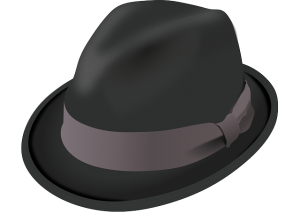
As hard as it can be to write a novel, selling and marketing can be even trickier. Often the skills required for the “business” side of the industry are ones a writer has never fostered.
This can make the “what do I do now” question after finishing a manuscript exceptionally daunting.
For the next couple of blog posts, I want to put out some basic information about publishing fiction. Keep in mind there are exceptions to any “rule” and every author has a different publishing story, but this will give new writers a sense of what’s in store after they write “The End.”
In this blog I’m going to cover the three basic tiers of publishing. Next week I’ll talk about the differences between an agent, an editor, and a PR company. For the last post in this series, I’ll discuss the elements of a query letter and how to assess if your work is ready for submission.
Three Tiers of Publishing
There are three basic tiers in the publishing industry. Big 5 (or 6), independent or small press publishers, and self-publishing.
Big Five
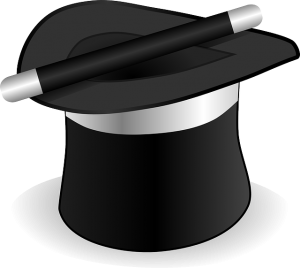 Traditional publishers are often called the “Big Five.” These publishing houses are: Hachette Book Group, Penguin Random House, HarperCollins, Simon & Schuster, and Macmillan. Each of these houses have a number of imprints that fall under the parent company. For example, Hachette Book Group owns Grand Central Publishing, Penguin Random House owns Berkley, and Macmillan owns St. Martin’s Press.
Traditional publishers are often called the “Big Five.” These publishing houses are: Hachette Book Group, Penguin Random House, HarperCollins, Simon & Schuster, and Macmillan. Each of these houses have a number of imprints that fall under the parent company. For example, Hachette Book Group owns Grand Central Publishing, Penguin Random House owns Berkley, and Macmillan owns St. Martin’s Press.
When we think of “publishing” we often think of these five groups and their imprints. Their books are published in hardback, e-books, and audio, as well as paperbacks. Authors published through the Big 5 are found in bookstores, libraries, big box stores, and online around the world.
So why (or 6)?
In recent years, Amazon Publishing has burst on the literary scene. Amazon publishing is separate from the self-publishing wing, CreateSpace. Amazon has its own list of imprints, including romance, mystery, and children’s books. Due to their extensive sales and forward-thinking marketing and online strategies, along with their agent-only submission guidelines, the term “Big 6” has starting to be used in the industry.
Big 5 and Amazon Publishing companies all require agent submissions. With a few minor exceptions, an author cannot submit to these publishers on their own. Some exceptions are: a personal relationship with an editor at a Big 5 house, meeting an editor at a conference or workshop and receiving an invitation to submit, or a contest for submissions, such as St. Martin’s/Minotaur/Mystery competition for unpublished mystery authors.
Independent or Small Press Publishers
 There are a number of high quality, independent publishers. These are sometimes referred to as “small press” publishers. The term “indie” press used to refer solely to independent publishers, but it has started to be used interchangeably with self-published authors. Authors should understand there is a distinction between “indie” meaning small press and “indie” meaning self-published.
There are a number of high quality, independent publishers. These are sometimes referred to as “small press” publishers. The term “indie” press used to refer solely to independent publishers, but it has started to be used interchangeably with self-published authors. Authors should understand there is a distinction between “indie” meaning small press and “indie” meaning self-published.
Small presses sometimes have only a couple, if any, imprints. They are often genre specific. So while a Big 5 publisher might have fantasy, romance, and children’s book imprints, an independent press might only carry mysteries or romance or sci-fi.
Small presses vary in their submission requirements. Some accept unsolicited, unagented manuscripts. Others require agent-only.
Examples of independent presses include: Kensington Publishing Corp, one of the most successful small presses in the country, Graywolf, which also publishes poetry, and Cottage Door Press, which publishes exclusively Children’s Books.
Small presses vary in their submission requirements. Some accept unsolicited, unagented manuscripts. Others require agent-only.
Small press author’s books are available everywhere and in multiple formats (hardback, paperback, ebooks, audio) but often not as many locations as those carried by a Big 5 publisher.
Both Big 5 and legitimate small publishers offer the following to their authors: A submission process, where manuscripts are vetted and approved for publication, not everyone who submits is published. Developmental and line editing as needed. Cover art and layout. All printing, acquisition of ISBN numbers, and formatting for ebook platforms. Printing and sales (Don’t confuse this with promotion!) are handled by the publisher. Authors never pay for services.
Authors receive a percentage of all sales. With a Big 5 and some small presses, the author receives an advance. This advance is paid regardless of actual sales. Many small presses don’t provide an advance, and authors only receive royalties through actual sales. This allows small presses to take chances on debut or less recognized authors and more challenging books.
Red flags for authors looking at small press publishers: reading/submission fees, author responsible for cover art, editing costs, or formatting, contracts requiring right of first refusal on future books outside of a specific series, and a publisher who won’t answer questions about the process or payments prior to signing a contract.
Self-Publishing
 The last tier is self-publishing. This process requires the author to cover all the production costs. The author provides cover art, the ISBN number, all editing, and formatting. There are a number of services that an author can pay for to self-publish. The most well known are Amazon’s CreateSpace (Not to be confused with Amazon Publishing), Lulu.com, and IngramSpark.
The last tier is self-publishing. This process requires the author to cover all the production costs. The author provides cover art, the ISBN number, all editing, and formatting. There are a number of services that an author can pay for to self-publish. The most well known are Amazon’s CreateSpace (Not to be confused with Amazon Publishing), Lulu.com, and IngramSpark.
Self-publishing does give an author total control. There are, however, some downsides. Unless an author sells thousands of copies, a self-published book does not make an author more attractive to an agent for future books. Some agents even recommend against mentioning self-published books unless sales are very high or a book has received a number of awards or exceptional reviews from legitimate sources.
The number one mistake new authors make with self-publishing is not using professional editing services.
Many authors start out not realizing how important a role editors play in the writing process. Even experienced, well-know authors work with developmental and line editors for each of their novels. The number one mistake new authors make with self-publishing is not using professional editing services. No one edits their own work well!
The cost of self-publishing varies by the service an author chooses. Bookstores and libraries often won’t carry self-published books, so an author may have to be more creative about how to market and sell books.
Regardless of which tier an author publishes with, most authors have to do a large percentage of their own promotion. So keep in mind, just because a Big 5 or small press handles the PRINTING and SALES of an author’s books, the author still has to do the promotion. This may include social media and online content (blogs, blog tours, Facebook, Websites, Twitter, Instagram, YouTube, articles), public appearances, and contacting bookstores and libraries. The actual printing and sale of books will be handled by the publisher, but getting books out in front of the public often falls to the author. If you sign with a publisher, make sure you have a clear understanding about the promotion the publisher plans to do and what their expectations are for you.

Books are hard to sell. The market is inundated. As an author, especially early career, you are going to have to learn to do promotions.
Or even write blog posts about the publishing industry!
See you next week with a new post about agents, editors, and PR companies.
The post Publishing Basics For Fiction Writers appeared first on Elena Hartwell.
June 24, 2018
Ellen Byron Talks Dogs, Writing, and Cajun
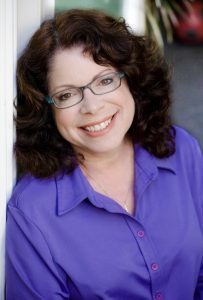 The Author …
The Author …Ellen writes the award-winning Cajun Country Mystery series. In a starred review, Publishers Weekly called her most recent book, A Cajun Christmas Killing, “superb.” It won the Left Coast Crime Lefty Award for Best Humorous Mystery, as did Body on the Bayou, the second book in the series. Both books were nominated for Best Contemporary Novel Agatha Awards.
Her debut Cajun Country Mystery, Plantation Shudders, made the USA Today Bestsellers list, and was nominated for Agatha, Lefty, and Daphne awards. Ellen is also a recipient of a William F. Deeck-Malice Domestic Grant from the Malice Domestic Convention. Find out more about Ellen on her WEBSITE or on TWITTER and FACEBOOK
The Interview …
You’re from New York and live in LA, but you write the award-winning Cajun Mystery Series. What made you choose that location over other places you’ve been?
I fell in love with New Orleans and Cajun Country when I went to Tulane. When my parents would come to visit, we’d putter around south Louisiana and I was just fascinated by the music, the food, the people, and yes, the language. To this day, there are people who choose Cajun French as their first language. I always wondered what drew me to the culture, and decided it’s because it somewhat mirrored my own background. My mother was born in Italy and so I grew up with a culture within a culture on that side of my family. We lived in New York, but I could go a weekend without hearing English if I spent time with my nonna or other relatives. That’s what Cajun Country is—a culture within a culture.
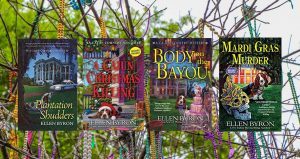
” … let me tell you, you don’t have writers block when someone’s paying you to deliver.”
You’ve worked as a playwright , journalis t, and television writer in addition to writing novels. How do those forms differ in terms of process? How do they inform each other ?
Playwriting is most similar because it’s my baby, from my imagination. As a journalist and television writer, I’m for hire, unless I’m doing a pilot. Even then, I have a studio to answer to and/or a network, although it’s still a very creative process. But those two disciplines gave me a great writer’s work ethic. My goal with every project, including my series, is to beat a deadline. And let me tell you, you don’t have writers block when someone’s paying you to deliver. You can’t tell a magazine or TV network, “The muse just didn’t visit today.” It’s a surefire career killer.
Cozy readers love holiday-themed books. The third in your series, A Cajun Christmas Killing fits the bill—what do you love about holiday books? Are you a lover of the holiday seaso n?
 I love Christmas. Always have, always will. It’s really the one holiday I get excited about, although when my daughter was little, Halloween was a thrill. I’ve been collecting Christmas ornaments since I was a kid. In fact, when I was in middle school, my mother announced we weren’t going to have a tree anymore. Noooo!!!!!!! I told her I’d take over decorating and undecorating, and I did.
I love Christmas. Always have, always will. It’s really the one holiday I get excited about, although when my daughter was little, Halloween was a thrill. I’ve been collecting Christmas ornaments since I was a kid. In fact, when I was in middle school, my mother announced we weren’t going to have a tree anymore. Noooo!!!!!!! I told her I’d take over decorating and undecorating, and I did.
What I particularly loved in A Cajun Christmas Killing is that I got to share about the unique Louisiana tradition of bonfires on the levee, AND I got to send my characters to New Orleans, so I got to describe how beautiful the city is at the holidays. In my next book, Mardi Gras Murder, I get to write about Louisiana’s favorite holiday. They have a great sweater I almost bought. It’s decorated with Christmas motifs, but reads “Happy Almost Mardi Gras.” Hi-larious!
What is your favorite part of writing a series? Do you ever consider writing a standalone? (or a second series ).
Funny you should ask. I wrote the first draft of a stand-alone, inspired by the real-life disappearance of my paternal grandfather in 1933. It’s set in the past and present. I have to take another hard pass at it, then get some additional feedback. I’ve never used a developmental editor, but I might for this book. It’s a passion project and I really want to sell it.
As to another series, my agent is taking out a proposal as we speak, for a cozy series inspired by my Italian relatives. Fingers crossed on that. I’m also noodling with another series idea. I really do love writing series. You fall in love with your characters and the fictional world you create – they become so real to you.
But I think my passion for writing mystery series is also a by-product of working on TV series. With every show, comedy or drama, you have the season and series arc on top of the story of the week. To me, that’s what a mystery series is. You have the “story of the week” in each book—the mystery to be solved—but you also have the overall arc of the characters’ lives.
“I have to have dogs in my life.”
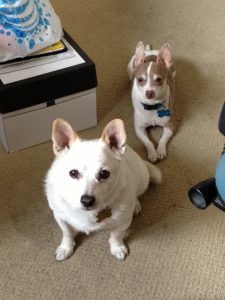
We’re both dog people … tell us about your dogs, how do they keep you grounded in the craziness of a writing career ?
When my husband and I were dating, I told him early on that if he wasn’t interested in having dogs, there was no point in continuing our relationship. I have to have dogs in my life. They absolutely keep me grounded. I call Pogo and Wiley my therapy dogs. If I’m anxious or depressed, I pet them and instantly feel better. I honestly can’t imagine life without them.
What are you working on now ?
I just finished a draft of the 5th book in my series, tentatively titled “Killer Cajun Music Festival.” As soon as I get that out to beta readers, I’ll go back to the stand-alone and take another crack at it.
” … go for it!”
Final Words of Wisdom:
Just. Write. Seriously. The only time I had true writers block was right after the 2016 election. I was so depressed that I couldn’t face writing my humorous mystery series. A writer friend told me, “Write 15 minutes a day. Anyone can do that. If it’s longer, great. But start there.” I did, and the time I spent writing grew. Then I set myself a goal of writing 1000 words a day. If I wrote more, great. If you do that, you have a draft in less time than you’d think possible.
I also outline, which I think is the result of my “day job” as a television writer where outlines are part of your job requirement. I always feel like I’m on the defensive because so many people are pantsers – writing by the seat of their pants—but I find laying out a plot and creating a 35-40 page outline is as organic as any other process. And believe me, that outline isn’t gold. I can go over it three times before I start a draft and still find holes when I’m writing. But just having laid down the bones, plus some dialogue and other beats when inspired, really helps me power through a draft.
But find what works for YOU. That’s the most important thing. And then… go for it!
Thanks for visiting!!
The post Ellen Byron Talks Dogs, Writing, and Cajun appeared first on Elena Hartwell.
June 10, 2018
Baron Birtcher: On Music and Writing in Hawaii and Oregon
Thrilled to have author Baron R. Birtcher with me on my blog today! Such a fun interview …
The Author …
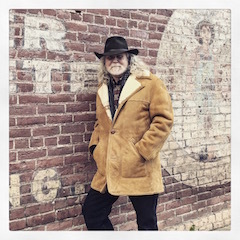 Baron R. Birtcher spent a number of years as a professional musician, guitarist, singer and songwriter and founded an independent record label.
Baron R. Birtcher spent a number of years as a professional musician, guitarist, singer and songwriter and founded an independent record label.
His first two hardboiled mystery novels, Roadhouse Blues and Ruby Tuesday were Los Angeles Times and IMBA Best-Sellers.
Angels Fall, the third installment in the critically-acclaimed Mike Travis series, was nominated for the 2009 Left Coast Crime Award (the “Lefty”) for Best Law Enforcement/ Police Procedural novel of the year.
Rain Dogs is Mr. Birtcher’s first stand-alone novel, and a Claymore Award finalist.
He has also had the honor of serving as a judge for both the Edgar and the Shamus Awards.
The Interview
Your “first” artistic career was in music, as a musician, singer, songwriter, and founder of an independent record label. How did that artistic path inform your writing career? (And yes, that is Baron with Randy Meisner of the Eagles …)
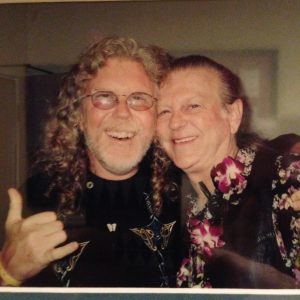
As it turns out, my background in the music business has informed my writing quite a bit. For starters, with one exception, my book titles all come from songs. The exception is Hard Latitudes. (There’s a story behind that, but I’ll save it for another time. Now we have to do another interview because I’m curious!).
More importantly, though, I think of a book in the same way that I used to think of an “album” or LP. The songs have to segue smoothly, the tempo and tone have to take you somewhere as a fan, emotionally speaking; and finally, the work has to be cohesive, has to have a stylistic thread that ties the whole work together tastefully. I try very hard to use descriptions and dialogue to evoke a mood, much like a song would, and I believe there’s a certain “rhythm” to my work.
Also, if you want to really geek-out on the music thing. I have a certain ritual that accompanies the writing of each project. I come up with the title first (after the plot, of course) then create a set-list (a mix tape, so to speak) that represents the feeling that I want the book to “sound” like. During the writing process, I limit my exposure to music to that particular set of songs until I’ve finished the manuscript. What I’ve found that it helps keep me in the proper mindset, the proper historical zone, so that I can have that soundtrack in mind as I sit down to write each day. It keeps me in my lane, tonally. Readers will find many of the songs on the soundtrack I referenced as section headings in my books.
Are you sorry you asked me that? 

